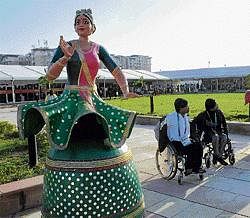
From Inuit art from Canada to textiles from across the Commonwealth world, and from children’s theatre from India to classical music and dance, Delhi will come alive with culture during the Games period, giving an opportunity to sports-loving tourists to also savour life beyond sports.
One of the biggest attractions will be whale-bone figurative sculptures that are part of the exhibition “Sanaugavut: Inuit Art from the Canadian Arctic” that began at the National Museum on Tuesday. This is the first time that Inuit art work has come to Asia.
The exhibition, which will continue till January two, is a major initiative under the Indo-Canadian MoU on cultural ties, and also has stone and ivory cultures that are part of the precious collections of the National Gallery of Canada (NGC). The exhibition kicked off with a two-day workshop-cum-training for students and artists on indigenous art led by five renowned artists from Commonwealth nations across four continents.
Indigenous Canadian artist William White, who is a member of the Tsimshian community known for weaving the traditional raven's tail, double-headed ravens crests, sea creatures and starfish emblems with cedar bark, mountain goat and marino sheep wool on traditional dancing aprons and woollen ceremonial robes, was the main draw at the workshop.
From India, Gond artists Shubhas Vyam and Durga Bai from Bhopal, and ‘Pata chitra’ artists Montu and Jaba Chitrakar from Midnapore in West Bengal led sessions on Indian indigenous arts. Australian aboriginal artists Vicki Couzens and Marie Clarke of the Koorie Heritage in Melbourne also showcased their talents at the workshop.
“The Inuits (popularly known as the Eskimo people) have been there for more than 4,000 years and were ivory carvers. Fearing that their traditions would die, they took to sculpting to capture elements of a changing lifestyle and identity by the beginning of 1940,” Christine Lalonde, associate curator of the Indigenous Art at the National Gallery of Canada, said about the exhibition.
Another non-sports attraction during the Games is the exhibition “Power Cloths of the Commonwealth,” featuring textiles from 22 Commonwealth nations across five continents. Among the participating nations are Bangladesh, Canada, Cyprus, Ghana, Guyana, Kenya, Malaysia, the Maldives, Malta, New Zealand, Nigeria, Pakistan, the Papua New Guinea, Sierra Leone, Singapore, South Africa, Sri Lanka, Trinidad & Tobago, the United Kingdom and Zambia.
The exhibition, which started on Sunday at the Crafts Museum, has been organised through a collaboration of the Ministry of Textiles, the Australian government, and the RMIT Gallery, Melbourne.
This exhibition will be on till October 20.
Child actors from across the country are also all set to mesmerise theatre- goers in “Jashnebachpan”, the national children’s theatre festival organised by the National School of Drama. The festival is being held almost coinciding with the Games this time.
Meanwhile, Vice-President Mohammad Hamid Ansari will inaugurate another exhibition, “Commonwealth Upholding Sporting Traditions and Sporting Spirit,” at the National Archives of India on Thursday, while a range of other cultural activities will also start in the coming days across the capital.